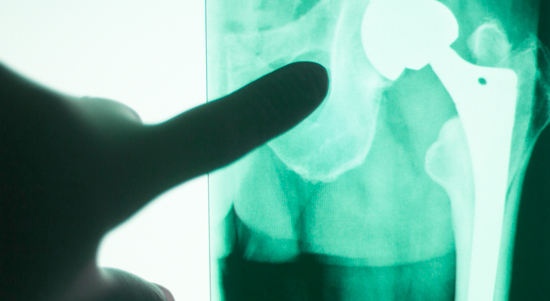
A large multi-center orthopaedic clinical trial that Nebraska Medicine researchers are a part of seeks to reduce the risk of blood clots and/or bleeding after hip or knee replacement surgery.
Called the Pulmonary Embolism Prevention after hiP and kneEReplacment (PEPPER), the goal of the trial is to enroll 20,000 patients over four years. Nebraska Medicine has enrolled approximately 600 patients in the study over the last two years.
"This is expected to be the largest definitive study to identify the best anti-coagulants for first-time and revision total hip and knee replacement surgeries," says Kevin Garvin, MD, Nebraska Medicine orthopaedic surgeon. "Many believe that total hip replacement surgery is the operation of the century, meaning it has one of the most successful outcomes of all surgeries with very low complications."
Nearly 1 million total hip and knee replacement surgeries are performed each year. "The risk of a blood clot in the lungs after surgery is 1% or less, but in the rare cases that it does occur, it can be life-threatening," Dr. Garvin says. "Blood thinners are used to reduce the risk of blood clots.
However, sometimes blood thinners may cause bleeding around the prosthesis, which can lead to wound problems or infection.
"The goal of this study is to determine the most effective blood thinners to prevent blood clots while also minimizing the risk of bleeding and surgical site complications," says Dr. Garvin.
The study compares the effectiveness of the three most commonly used blood thinners or anticoagulants – aspirin, warfarin and rivaroxaban. Each anticoagulant works a little differently and has pros and cons.
"This is an issue that the medical field has wrestled with for decades," says Dr. Garvin. "At Nebraska Medical Center, we typically use warfarin because it balances blood clot prevention and low bleeding risk. The PEPPER study will provide the answers for all of us."
The Nebraska Medical Center is a high-volume hip and knee replacement surgery center, averaging more than 1,500 surgeries annually. An internal study revealed that of the hip replacement surgeries performed with a minimum 15-year follow-up, there were no failures and only one patient required further hip surgery. Total knee replacements also have excellent longterm results, notes Dr. Garvin.
However, where a patient receives a joint replacement can have an impact on the outcome of the surgery. "As a high-volume center, when you go to the Nebraska Medical Center, you know you are going to receive the best results, using state-of-the-art technology, from highly trained physicians and nurses," says Dr. Garvin.
Patients ages 50 to 70 with osteoarthritis make up the bulk of total joint replacement patients. How do you know when it's time for a joint replacement? A good rule of thumb is when it interrupts your activities of daily living or if the pain requires narcotic pain medications to manage it, notes Dr. Garvin. People in this stage often have trouble sleeping, waking up in the middle of the night and restrict much of what they do due to joint pain.
"Joint replacement surgery brings mobility and quality of life to millions of people each year," he says.
If you are interested in participating in clinical trials such as this one and others, a complete list is available at NebraskaMed.com/Clinical-trials.

